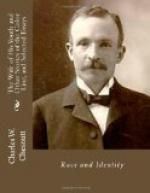“Dat ‘u’d suit you,” chuckled aunt Milly, “an’ you ’d stay dere fer de secon’ table, too. How dis man know ’bout all dis yer foolis’ness?” she asked incredulously.
“He come f’m de Norf,” said uncle Wellington, “an’ he ’speunced it all hisse’f.”
“Well, he can’t make me b’lieve it,” she rejoined, with a shake of her head.
“An’ you would n’ lack ter go up dere an’ ’joy all dese privileges?” asked uncle Wellington, with some degree of earnestness.
The old woman laughed until her sides shook. “Who gwine ter take me up dere?” she inquired.
“You got de money yo’se’f.”
“I ain’ got no money fer ter was’e,” she replied shortly, becoming serious at once; and with that the subject was dropped.
Uncle Wellington pulled a hoe from under the house, and took his way wearily to the potato patch. He did not feel like working, but aunt Milly was the undisputed head of the establishment, and he did not dare to openly neglect his work.
In fact, he regarded work at any time as a disagreeable necessity to be avoided as much as possible.
His wife was cast in a different mould. Externally she would have impressed the casual observer as a neat, well-preserved, and good-looking black woman, of middle age, every curve of whose ample figure—and her figure was all curves—was suggestive of repose. So far from being indolent, or even deliberate in her movements, she was the most active and energetic woman in the town. She went through the physical exercises of a prayer-meeting with astonishing vigor. It was exhilarating to see her wash a shirt, and a study to watch her do it up. A quick jerk shook out the dampened garment; one pass of her ample palm spread it over the ironing-board, and a few well-directed strokes with the iron accomplished what would have occupied the ordinary laundress for half an hour.
To this uncommon, and in uncle Wellington’s opinion unnecessary and unnatural activity, his own habits were a steady protest. If aunt Milly had been willing to support him in idleness, he would have acquiesced without a murmur in her habits of industry. This she would not do, and, moreover, insisted on his working at least half the time. If she had invested the proceeds of her labor in rich food and fine clothing, he might have endured it better; but to her passion for work was added a most detestable thrift. She absolutely refused to pay for Wellington’s clothes, and required him to furnish a certain proportion of the family supplies. Her savings were carefully put by, and with them she had bought and paid for the modest cottage which she and her husband occupied. Under her careful hand it was always neat and clean; in summer the little yard was gay with bright-colored flowers, and woe to the heedless pickaninny who should stray into her yard and pluck a rose or a verbena! In a stout oaken chest under her bed she kept a capacious stocking, into which flowed a steady stream of fractional currency. She carried the key to this chest in her pocket, a proceeding regarded by uncle Wellington with no little disfavor. He was of the opinion—an opinion he would not have dared to assert in her presence—that his wife’s earnings were his own property; and he looked upon this stocking as a drunkard’s wife might regard the saloon which absorbed her husband’s wages.




